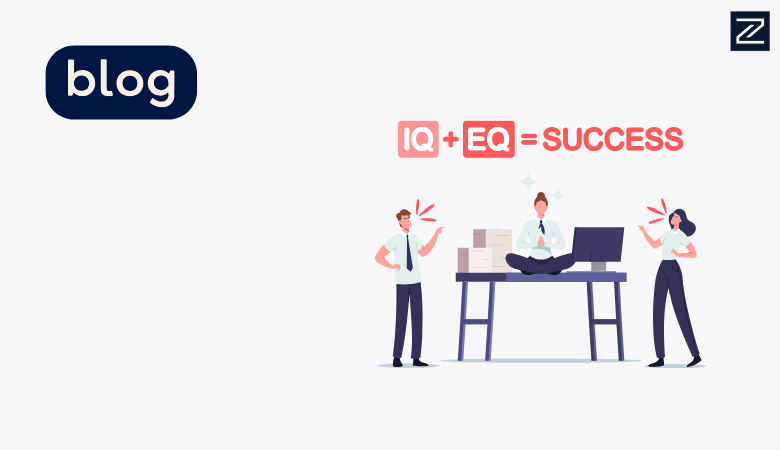In most workplaces, performance is measured through productivity, deadlines, targets, and technical skill sets. But behind the scenes, another powerful force is shaping how teams operate, solve problems, and connect. That force is emotional intelligence. Though it rarely appears in job descriptions or KPIs, emotional intelligence (EI) plays a critical role in day-to-day interactions, decision-making, and team culture.
Whether it’s handling a stressful client call, giving feedback, or navigating office dynamics, the ability to manage emotions, both your own and others’, can determine how effective, respected, and resilient a professional is. EI helps people communicate without conflict, express without offending, and lead without dominating. It influences how leaders lead, collaborate and grow.
Understanding Emotional Intelligence
Emotional Intelligence is the ability to recognize, understand, and manage one’s own emotions while also being sensitive to the emotions of others. It allows people to stay grounded, build trust, and most importantly respond instead of react.
A related term often used is Emotional Quotient (EQ), which is the measurable side of this ability. EQ can be developed and strengthened over time, making it a skill anyone can grow with the right mindset and tools.
Zenfide’s Approach to Emotional Intelligence
At Zenfide, we treat EI as a core foundation of professional and team development, not just an add-on skill. Our learning modules integrate emotional awareness into real workplace challenges, allowing individuals to grow emotionally while becoming more effective and reliable professionals.
Respond not react
In a world that rewards speed, pausing is underrated. Neuroscience shows that even a 3-second pause allows the prefrontal cortex to override emotional impulses, leading to smarter, calmer decisions.
We help employees build awareness of their own emotions and understand others better before jumping to conclusions.
#Encourage pause and reflect habits before responding to triggers
#Build emotional vocabulary to name feelings clearly
#Promote checking facts before reacting emotionally
#Reduce impulsive responses through self awareness tools
Listening to comprehend
Most people hear to reply, not to understand. Studies at MIT’s Human Dynamics Lab show that good listeners build more productive and creative teams.
Zenfide’s programs encourage empathy driven conversations that build trust and clarity:
#Train employees to listen without interrupting or judging
#Practice active listening in real workplace scenarios
#Teach verbal and nonverbal cue recognition
#Foster two-way communication that values input
Managing emotions under pressure
It’s not pressure that derails performance, but poor emotional regulation. Studies on emotional agility show that professionals who can recognize and process emotions without becoming reactive maintain greater composure, resilience, and clarity under stress.
Emotional resilience helps teams stay calm and effective, even in tough situations.
#Identify emotional triggers during high stress tasks
#Use breathing, breaks, or reframing to stay composed
#Teach self regulation techniques for real time control
#Promote supportive peer responses during tense moments
Fostering safe spaces
Innovation dies in silence. Safe spaces aren’t about comfort- they’re about creating the freedom to speak, fail, and grow without fear.
Emotionally intelligent teams create environments where everyone feels heard and respected.
#Encourage inclusive discussions where all voices are valued
# Normalise admitting mistakes and seeking help
#Train leaders to respond to feedback with curiosity, not defensiveness
#Reduce silence through open dialogue practices
Emotional Intelligence at Work
Emotional intelligence isn’t just something individuals work on—it’s a mindset that can shape an entire organization. When teams collectively practice empathy, self-awareness, and emotional control, workplaces transform for the better.
Here’s what a high-EQ culture can lead to:
#Conflicts are no longer about ego or blame but become healthy, solution-oriented discussions that move work forward.
#Communication across teams improves as people feel heard, respected, and safe to express concerns or ideas.
#Leaders who lead with emotional intelligence foster deeper trust, stronger morale, and a sense of belonging in the workplace.
#Teams grow more connected, collaborative, and adaptable, navigating change with confidence and emotional balance.
By embedding emotional intelligence into workplace learning, organizations don’t just improve productivity- they transform how people experience work itself. Emotionally intelligent teams create a culture where trust, adaptability, and innovation thrive. As Daniel Goleman aptly puts it, “We have two minds, one that thinks and one that feels. Emotional intelligence is what bridges the two.”
At Zenfide, we help embed emotional intelligence at every level; from one-on-one coaching to immersive group sessions. Our learning journeys are designed not just to train, but to shift how people think, feel, and interact every day.
In today’s fast-changing world, where AI handles the technical, human skills like emotional clarity and empathy have become the ultimate advantage. Studies show that people with high EQ are more likely to be promoted, lead well, and bounce back from challenges. In a world increasingly driven by technology, this human bridge remains a company’s most powerful advantage.
By investing in Emotional Intelligence across, organisations don’t just build better teams—they build future-ready, people-first workplaces.









